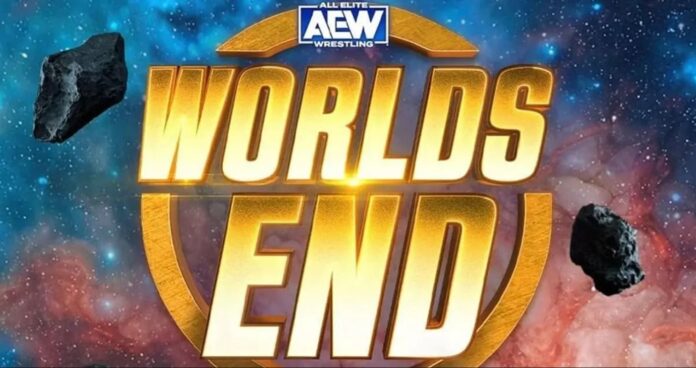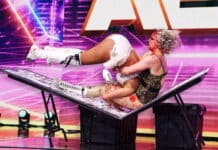
All Elite Wrestling’s final pay-per-view of the year, Worlds End, is in the books. I wrote an article earlier this week to discuss if management had sold the PPV enough on television with the angles and match-ups to prompt fans to spend another $50 of their “wrestling budget” to order the show. I don’t want to sound repetitive, but the case remains the same for All Elite, at least in my opinion, in terms of their overall presentation of pay-per-view cards. As we see more often than not with these events, the broadcast usually spotlights some of the best and worsts aspects of the product over the course of the show. The same stellar wrestling was there along with some of the same bad habits that take away from the overall quality of the PPV.
The show opened with Will Ospreay and Kyle Feltcher in the semi-final bout of the Continental Classic tournament, with the winner advancing to wrestle either Ricochet or Okada later in the night. In many ways, this Ospreay/Feltcher bout was a microcosm of AEW itself, there were tremendous strong points, both with the in-ring action and the intentions of the storyline portions, but it also displayed the previously mentioned bad habits that subtract from the grand scheme of things. Something that can often be said about some of the over-the-top “work rate” matches on AEW pay-per-views is that within a vacuum, they are very well done in terms of the athleticism and effort put into the contests. For all the rightful criticism of the AEW product, nobody can deny that the talent is working hard more often than not. However, within the context of a nearly four-hour pay-per-view broadcast or how those specific characters are perceived within the landscape of the product, there’s often a disconnect. It can be seen at various points throughout Worlds End, but as far as placement and the type of match booked, Ospreay/Feltcher missed the mark in a few different ways. Again, taking nothing away from their talent, but rather to point out the possible flaws of the presentation. Some of the opening sequences were overly-choreographed and had the common critique of being too much of a routine rather than a physical confrontation, but it’s important to keep in mind that those type of spots are what the die hard AEW fans look for with these types of matches. The bout told a good narrative as the physicality intensified, even if they fell into the pitfall of just standing there while they no sell chops for one of the most over done and minimally effective spots of the modern era. Outside of the silly chop sequence, the selling was well done, and Ospreay did very well in his role as the fiery baby face.
This was essentially a 15-minute fireworks show where the two great athletes threw almost everything against the wall. At one point, Ospreay started bleeding buckets and it was a memorable visual. Eventually, after a good series of counter maneuvers, Ospreay landed the Styles Clash to get the win to advance to the finals. Credit where it’s due, Fletcher continues to evolve into his own as a heel after more or less just being a random Ospreay sidekick prior to this. Ospreay fighting through the blood to get the victory is exactly what you want for a guy that is going to be moved up to the top spot in the company.
The major problem is, the pieces of this puzzle were completely misplaced. Ospreay had the presentation and the visual of the top guy, but he’s not positioned in that spot, particularly based on the results of the show and the fact that it was implied that there will be a rubber match between him and Fletcher. Furthermore, these two had a main event structure for the opening match of the show. The guy that bled the most on the card was the first segment so anything after that, including the MJF/Adam Cole match about an hour later was considerably less effective. Yes, I understand why they’d want Ospreay to bleed in theory, as it stacks the deck against him later in the night for the finals, but maybe that wasn’t the best choice given that other matches were scheduled to have blood on the same show? Finally, this was a high intensity spot fest, and yes, that’s more or less the AEW brand, but again, placement on the card is key because it’s very difficult to properly pace a show when these two did every high spot in the book in the opening segment. If a match like this was in the main event, the argument could be made that its strong points could’ve been emphasized without taking away from the rest of the card, but if I had to guess, I’d say that Tony was going for star ratings, not booking logic for this match.
After that Ricochet and Okada worked the other semi-final bout for the tournament, and it was a solid contest, but you can definitely see when the Japanese superstar puts it in second gear or decides to coast in the ring. The fans have soured on Ricochet because his mic work is cringe worthy, but it’s still surprising that someone that you’d think would be tailor-made the the All Elite fans base was panned so quickly in his tenure in the company. So, I understand that he must embrace the hostility and work with it rather than try to go against the grain to end up in a lame duck situation. That being said, I think Ricochet taunted the crowd a little too much and a little too often to the point that it might’ve unintentionally taken away from the match. The sequences had very impressive athleticism, and Ricochet is still one of the best aerial wrestlers in the business, but the contest didn’t quite develop a consistent pace prior to the conclusion. Outside of the jeers from the crowd, this was somewhat of an odd presentation because Ricochet is clearly a heel now, but Okada is also still a villain, despite the lack of direction for his character for a storyline so it was also difficult for either competitor to build momentum for the narrative of the segment. Okada got the win after he hit the rainmaker clothesline to advance to the finals.
As far as misguided portions of the product, the AEW Women’s championship match was a prime example of it. Mariah May has done a great job with the heel character since she turned on Toni Storm, which would theoretically set up for a grudge match at some point, but instead Toni is stuck working a silly amnesia angle, which completely muddiest the waters if the clash between the two is planned for the future. Sometimes the simplest answer is the right answer. Tony doesn’t need charts, graphs, or any of his other E-fed tropes from booking on the internet to present a Storm/May grudge match. The baby face that is over with the crowd wants to get revenge for the sneak attack from the dastardly heel. That’s the only justification that would be needed to put Storm vs. May in a featured spot on pay-per-view.
Instead, it was Thunder Rosa, who was off of television with an injury for an extended period of time and then more or less just didn’t wrestle for a while, taking a spot at the Spanish announce table for a few months, before she recently was back on Dynamite. The Tijuana street fight was nothing more than a flimsy excuse to put a gimmick match on the show. Aside from the fact that it was clunky and sloppy at certain points, I honestly don’t think the Thunder Rosa character has enough momentum or the secondary feud between her and Mariah May justifies a gimmick match like this on pay-per-view. If this was Storm vs. May then there would be an argument to be made, especially because of the blood that was used in the original heel turn. The tacks that were used didn’t really mean anything because they are used too often on AEW television, and the piledriver through the table at the finish was brutal, as it looked like they slightly mistimed it. Mariah May retained the belt, and if there’s any question about if this feud needed this type of gimmick match, were any of the fans truly clamoring for Thunder Rosa to win the title?
Speaking of grudge matches, MJF/Adam Cole is the “grudge match” that nobody wanted to see, as anything linked to the failed mask reveal at this pay-per-view last year is completely counter productive. The angle was a total flop, and any continuation of it is simply an anchor dragging down both athletes to do anything productive. The match was fine, but for two guys that were thought to be franchise players for the company at one point, this was a mid-card match where the fans weren’t behind the baby face and the segment was almost forgettable by the time the show went off the air. MJF is just spinning his wheels at this point, and perhaps he’s getting paid enough that it doesn’t matter, but this feud has literally kept him in the same spot for more or less a year. Friedman signed a new deal earlier this year when he returned from injury, revealing an AEW tattoo that can be easily covered up by wrestling boots should he decide to work elsewhere in the future so depending on the length of the contract, he might be content to work the extremely light All Elite schedule even if he isn’t positioned for a major role in the company. As far as Adam Cole, he’s a great guy and very talented, but for someone that originally was thought to have the potential to be the next Shawn Micheals, he definitely isn’t anywhere near that status. The segment was somewhat flat when the entire baby face stable beat down the heel after the match, which saw MJF defeat Cole with a low blow and then a pile driver. Friedman wins, but he doesn’t have much momentum at all, especially because of how convoluted the storyline was with the Undisputed Kingdom to get to this PPV match. The same can be said for Cole, as he has no momentum or direction after this event.
Thankfully, the card picked up from here, as the next three matches had some meat on the bone so to speak in terms of quality action that provided some substance for the pay-per-view. Powerhouse Hobbs is someone that was lost in the shuffle at various point prior to the knee injury that put him on the shelf for a few months, but this match for International championship showed why he has the potential to be a major asset for the company. Konosuke Takeshita is one of the best in the business right now and checks all the boxes for someone that you can build a company around, particularly for a fan base that is at least vaguely aware of the Japanese scene. Everything they did in this contest was solid and made sense. Hobbs took a brutal bump on the apron on his knees and it eventually played a role in the finish when Takeshita retained the title. This segment showed what can be accomplished when proper selling is incorporated with the usual AEW style.
I said last month that Mercedes Mone had the best match of her AEW career against Kris Statlander, and the same could be said about the match at Worlds End. Statlander might not be the biggest star, but she’s a solid pro that is a very valuable asset to the women’s division. Everything they did in the match was crisp and smooth, outside of a scary looking piledriver spot on the apron where it looked like Statlander might’ve gotten legitimately spiked on her head when Mone slipped slightly during the maneuver. The 25-minute bout made Mone look like the star that they hoped she’d be when she arrived in the organization earlier this year. The problem is, Mone is going to have to work with more opponents than just Statlander so it remains to be said if she can continue to improve her status AEW. Mercedes retained the title after a series of counters saw her get the pin to win the match.
The finals of the Continental Classic was really good, and it was an example of when Okada put it in second gear to deliver a really solid performance. This is just my two cents on the matter, but it looks like Okada works to the level of his opponent or the situation. When he’s booked for a match that lacks importance, he mails it in, but on pay-per-view, at least on this occasion, he proved why he had such a tremendous reputation prior to his AEW debut. Outside of the match with Pac earlier this year, this finals bout with Ospreay was the first glimpse of the New Japan Okada that was seen in AEW. You could parse detail, but as far as the in-ring action, this was basically a more dramatic version of the earlier Ospreay/Fletcher match. The argument could be made that maybe the blood would’ve been more useful here than in the opening segment. There was an incredible series of counters and maneuvers prior to the finish. This was top-tier quality stuff, and if All Elite could focus more on this aspect of the product then there might be a better perception of the organization. More than anything, this match proved that Ospreay should be the top guy in AEW. Okada won after he hit the rainmaker clothesline, and while it’s more or less the same place that he started because he was the champion before the tournament, it’s good to see that he can still go in the ring the way that he did in New Japan.
The main event was more or less just a random brawl and then a series of moves between the four competitors prior to the finish. As I said in the article about the pay-per-view earlier this week, it’s a lazy booking crutch to use a four way as the main event for the title since it’s basically a substitute for a compelling main event storyline. Moxley retained the title. Post-match, Adam Copeland return and was joined by FTR to set up a six man tag against Moxley’s group this week on Dynamite. As much as the former Edge had a legendary career, his AEW tenure was underwhelming, and I’m not sure how much stock Tony Khan should be into the 51-year-old star. Hopefully, this was just a set up for the episode of Dynamite that will be included on the Max platform, because with as much great younger talent that’s on the roster, it’s probably not necessary for there to be a Moxley/Copeland feud for the title.
What do you think? Share your thoughts, opinions, feedback, and anything else that was raised on Twitter @PWMania and Facebook.com/PWMania.
Until next week
-Jim LaMotta
E mail drwrestlingallpro@yahoo.com | You can follow me on Instagram, Facebook, & Threads @jimlamotta89






